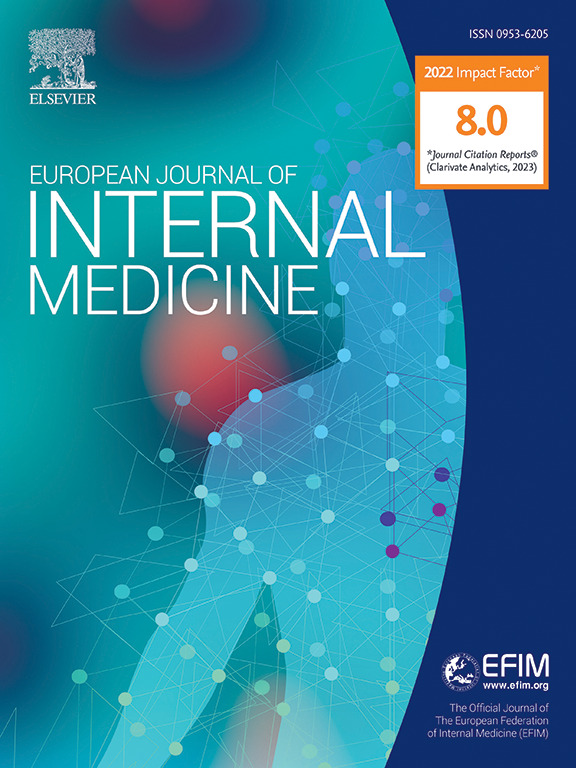睡眠改善医疗病房干预的效果:wessleep研究-一项随机临床试验。
IF 6.1
2区 医学
Q1 MEDICINE, GENERAL & INTERNAL
引用次数: 0
摘要
目的:住院患者经常出现睡眠障碍,影响整体健康。虽然一些随机研究评估了个别的非药物干预措施,但没有一项研究评估了结合多种策略来改善睡眠的方法。本研究旨在评估多组分睡眠增强方案对住院患者的影响。方法:于2023年7月至2024年3月在荷兰某大型学术医院的6个科室进行wessleep聚类随机对照试验。能够提供知情同意并预计至少入住两晚的成年医疗患者有资格纳入研究。多组分干预包括推迟清晨的护理查房,培训医疗保健专业人员,优化睡眠干扰药物时间,提供耳塞和眼罩,以及进行夜间睡眠查房。主要结果是第二晚的睡眠质量,用理查兹-坎贝尔睡眠问卷(RCSQ)进行评估。次要结局包括睡眠量、30天死亡率、谵妄发生率和睡眠增强工具的使用。结果:分析291例患者资料。干预组报告睡眠质量更好,RCSQ得分中位数为66.6 (IQR 44.3-78.9),而对照组为55.7 (IQR 38.2-74.3) (p = 0.033)。两组在睡眠时间、30天死亡率和谵妄发生率方面均无显著差异。方案依从性从42%到73%不等。结论:本研究为医院提供了一个有价值的路线图,旨在通过改善睡眠管理来提高病人的护理。多组分干预可以显著改善病房的睡眠质量,这突出了结构化、非药物策略在常规医院护理中的潜力。本文章由计算机程序翻译,如有差异,请以英文原文为准。
The effects of sleep improving interventions in medical hospital wards: the WEsleep study - A randomized clinical trial
Objective
Hospitalized patients often experience disturbed sleep, affecting general health. While some randomized studies have assessed individual non-pharmacological interventions, none have evaluated approaches that combine multiple strategies to improve sleep. This study aimed to assess the effects of a multicomponent sleep-enhancing protocol in hospitalized medical patients.
Methods
The WEsleep cluster randomized controlled trial was conducted between July 2023 and March 2024 across six medical departments in a large Dutch academic hospital. Adult medical patients who were able to provide informed consent and were expected to stay at least two nights were eligible for inclusion. The multicomponent intervention included delaying early morning nursing rounds, training healthcare professionals, optimizing sleep-disturbing medication timing, offering earplugs and eye masks, and conducting evening sleep rounds. The primary outcome was sleep quality on the second night, assessed with the Richards-Campbell Sleep Questionnaire (RCSQ). Secondary outcomes included sleep quantity, 30-day mortality, delirium incidence, and use of sleep-enhancing tools.
Results
Data from 291 patients were analyzed. The intervention group reported better sleep quality, with a median RCSQ score of 66.6 (IQR 44.3–78.9), compared to 55.7 (IQR 38.2–74.3) in the control group (p = 0.033). No significant differences were observed in sleep quantity, 30-day mortality or delirium incidence. Protocol adherence ranged from 42 % to 73 %.
Conclusions
This study provides a valuable roadmap for hospitals aiming to enhance patient care through improved sleep management. A multicomponent intervention can lead to significantly better sleep quality in medical wards, highlighting the potential of structured, non-pharmacological strategies in routine hospital care.
求助全文
通过发布文献求助,成功后即可免费获取论文全文。
去求助
来源期刊
CiteScore
9.60
自引率
6.20%
发文量
364
审稿时长
20 days
期刊介绍:
The European Journal of Internal Medicine serves as the official journal of the European Federation of Internal Medicine and is the primary scientific reference for European academic and non-academic internists. It is dedicated to advancing science and practice in internal medicine across Europe. The journal publishes original articles, editorials, reviews, internal medicine flashcards, and other relevant information in the field. Both translational medicine and clinical studies are emphasized. EJIM aspires to be a leading platform for excellent clinical studies, with a focus on enhancing the quality of healthcare in European hospitals.

 求助内容:
求助内容: 应助结果提醒方式:
应助结果提醒方式:


